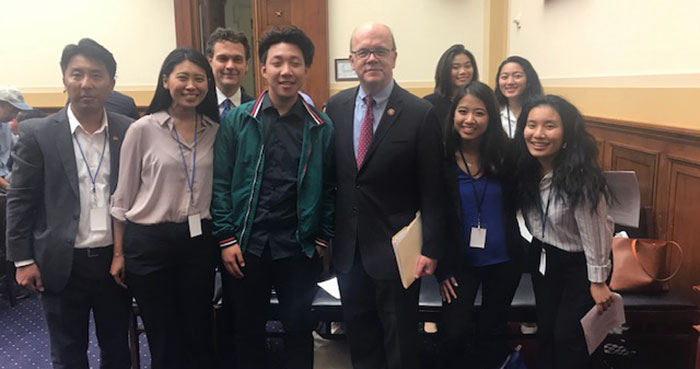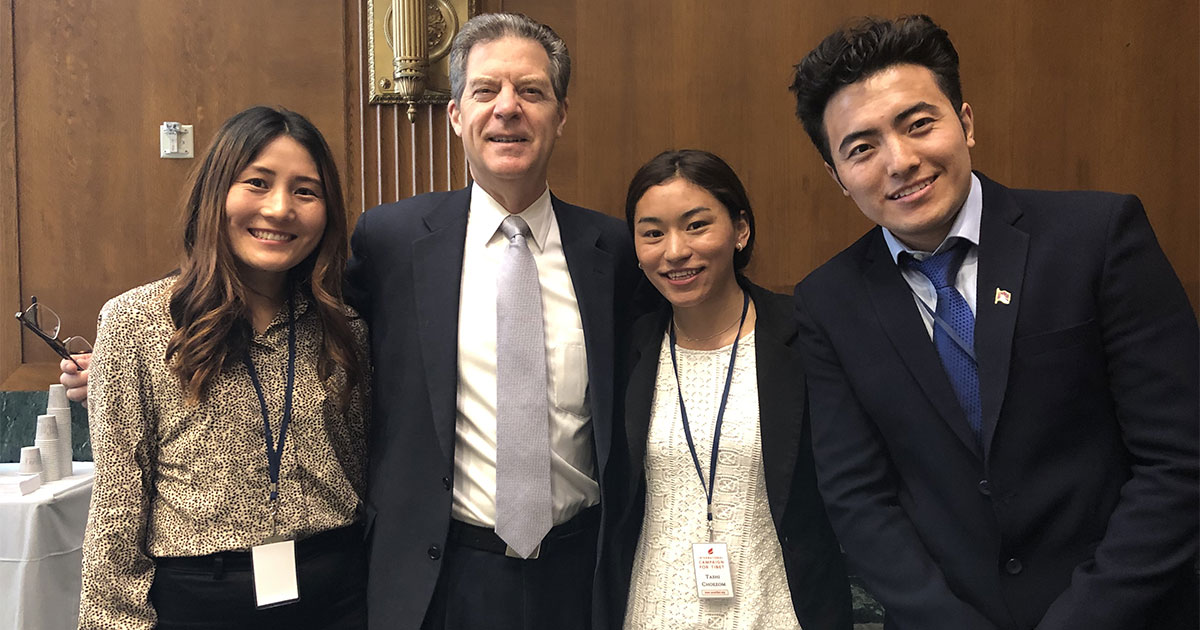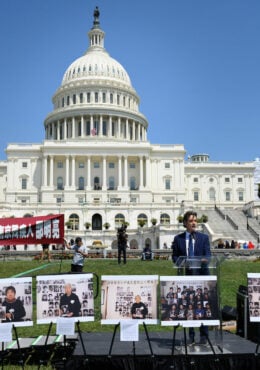As the world marked the 30th anniversary of the Tiananmen Square Massacre, top US leaders highlighted China’s moral injustices and said Tiananmen will never be forgotten. They also drew attention to the continuing suffering in Tibet.
In early June 1989, China’s People’s Liberation Army viciously attacked the Chinese activists who had gathered in Tiananmen Square in Beijing to protest for greater democracy and political reforms. Some estimates say thousands of people were killed.
In March of that same year, China declared martial law in the Tibetan capital of Lhasa following three days of protest in response to the shooting of Tibetans by security police in the Barkor, an important religious site. At least 70 Tibetans were shot dead from March 5 to March 7, and unofficial reports say at least 1,000 Tibetans were detained.
In the 30 years since those events, China’s government has become even more repressive toward both Tibetans and Chinese.
Congress speaks out
During a June 4 Congressional-Executive Commission on China hearing called “Tiananmen at 30: Examining the Evolution of Repression in China,” several legislators talked about China’s ongoing oppression in Tibet.
- House Speaker Nancy Pelosi (D-Calif.), who testified during the hearing—a rare occurrence for someone in her position—mentioned “the decades-long abuse faced by the Tibetan people, whose religion, culture and language the Chinese government is brutally trying to erase.” Pelosi also praised the passage last year of the bipartisan Reciprocal Access to Tibet Act (RATA), which takes aim at China’s isolation of Tibet from the outside world.
- Sen. Marco Rubio (R-Fla.), who introduced RATA in the Senate, called for solidarity with those being persecuted by the Chinese government. “We must stand with the oppressed Tibetan Buddhist monk, the silenced human rights lawyer, the imprisoned Christian pastor, the disappeared Uyghur Muslim, the disillusioned Hong Kong democracy activist and countless others living under the repressive policies of the Chinese government,” he said. “To do anything else dishonors the spirit of Tiananmen.”
- Rep. Eliot Engel (D-NY) said, “The Chinese Communist Party continues to violate international religious freedom by insisting that the party has a role in approving the Dalai Lama’s successor.” Last month, a bipartisan group of senators sent a letter to Ambassador-at-Large for Religious Freedom Sam Brownback urging him to “spearhead efforts by the US government and international community to ensure the 15th Dalai Lama is chosen according to religious practice, and not subject to governmental interference by Beijing or any other government.”
Participants in the International Campaign for Tibet’s (ICT’s) 2019 Tibetan Youth Leadership Program attended the hearing, where they had the opportunity to meet with Rep. Jim McGovern (D-Mass.), chair of the commission and one of the driving forces behind RATA’s success.

Participants in ICT’s 2019 Tibetan Youth Leadership Program met Rep. Jim McGovern (D-Mass.), chair of the Congressional-Executive Commission on China, during the commission’s hearing on the 30th anniversary of the Tiananmen Square Massacre.
Ambassador’s powerful speech
Some participants in the program also attended a religious roundtable addressed by Brownback on June 4 and were able to spend some time with him then.

Participants in ICT’s 2019 Tibetan Youth Leadership Program met Ambassador Sam Brownback during a religious roundtable on June 4 in Washington, DC.
One day earlier on June 3, Brownback devoted a significant portion of his speech at the National Endowment for Democracy’s “China’s Repression Model: Tiananmen, Today, Tomorrow” event to Tibet.
The ambassador began by explaining how China has stationed Communist Party cadres in Tibetan monasteries, expelled monks and nuns from their Buddhist institutes and forbidden Tibetan children from taking part in religious activities.
Brownback then moved on to discussing the tragic epidemic of self-immolations in Tibet, in which more than 150 Tibetans since 2009 have lit their own bodies on fire in protest of the Chinese government’s brutal policies. Brownback said monastic personnel and the friends of self-immolators have been ordered not to take part in religious burials or mourning activities for them.
Brownback also addressed the ongoing disappearance of the Panchen Lama, one of the most significant Tibetan Buddhist leaders, who was kidnapped by China as a six-year-old boy in 1995 and has not been seen in public since. Brownback said “We call upon the Chinese government to release immediately the Tibetan-recognized Panchen Lama or to share the truth about his fate with the world. We do not accept the Chinese government’s often-repeated and extraordinarily flimsy claim that he is studying and does not want to be disturbed.”
China’s record shows it is likely to interfere in the selection of the next Dalai Lama, Brownback warned.
“The international community must make clear now that we stand unequivocally with the Tibetan people,” he said. “We believe that members of the Tibetan community, like members of all faith communities, should be able to select, educate and venerate their religious leaders without government interference.”
Sec. of State’s answers for the record
Around the time of the Tiananmen Square Massacre anniversary, Secretary of State Mike Pompeo sent Congress answers for the record in response to questions legislators asked him during a House of Representatives hearing in March 2019.
Three of Pompeo’s answers dealt with Tibet:
QUESTION: Since 2010, the Chinese Government has suspended the official dialogue with the Dalai Lama’s representatives to resolve the Tibetan issue. In your written response to a question on Tibet during your confirmation hearing in April 2018, you said you “will express publicly, and at the highest levels of government, that Chinese authorities need to engage in meaningful and direct dialogue with the Dalai Lama or his representatives, without preconditions, to lower tensions and resolve differences.” Have you done so since then, and if so, what was the response from the Chinese authorities?
POMPEO: U.S. officials repeatedly raise Tibetan issues with Chinese government counterparts at multiple levels. We have pressed Chinese authorities to resume a dialogue with the Dalai Lama or his representatives without preconditions to engage in meaningful and direct dialogue to lead to a settlement that resolves differences. The Government of China, however, continues to characterize the Dalai Lama as a “separatist.” We believe that Tibetan communities, like all faith communities, should be able to select, educate, and venerate their religious leaders without government interference.
QUESTION: Since 2010, the Chinese Government has suspended the official dialogue with the Dalai Lama’s representatives to resolve the Tibetan issue. In your written response to a question on Tibet during your confirmation hearing in April 2018, you said you “will express publicly, and at the highest levels of government, that Chinese authorities need to engage in meaningful and direct dialogue with the Dalai Lama or his representatives, without preconditions, to lower tensions and resolve differences.” Since 1997, all U.S. Presidents have publicly challenged the sitting Chinese President to negotiate with the Dalai Lama or his representative to find a lasting solution to the Tibetan issue. Why has President Trump not done so yet during the U.S.-China Summits held to date?
POMPEO: The Administration is fully committed to implementing the Tibetan Policy Act. We urge Chinese authorities to resume a dialogue with the Dalai Lama or his representatives without preconditions and engage in meaningful and direct dialogue to lead to a settlement that resolves differences. U.S. government officials, including myself, the Vice President, the Ambassador-at-Large for International Religious Freedom, and officials from the U.S. Consulate General in Chengdu and U.S. Embassy in Beijing continue efforts to establish conditions that lead to that end. We continue to urge China to respect the human rights of Tibetans as well as their religious, cultural, and linguistic identity.
QUESTION: As required by RATA, have you already identified, and accordingly started to deny visas to the United States, to the Chinese officials responsible for creating and implementing these restrictive policies?
POMPEO: We are fully committed to implementing the Reciprocal Access to Tibet Act (RATA) in the timeframe prescribed by Congress. We are determining how to effectively press Chinese authorities for reciprocity with respect to the open access that China and many other countries enjoy in the United States, and how to identify those officials who are substantially involved in the formulation or execution of policies related to restricting access to Tibet. We are committed to working closely with Congress in pursuit of our shared goal ensuring that Americans have full access to China, including the Tibetan Autonomous Region and other Tibetan areas.
ICT president’s speech

ICT President Matteo Mecacci speaks at a Tiananmen Square Massacre rally hosted by the Victims of Communism Memorial Foundation outside the US Capitol on June 4, 2019.
Speaking at the Victims of Communism Memorial Foundation’s 1989 Tiananmen Square Massacre rally, Mecacci noted the massacre occurred 30 years ago; China took control of Tibet and forced the Dalai Lama into exile 60 years ago; and more than 1 million Uyghurs have been locked up in ‘re-education camps’ today.
“All this repression does not represent the strength of the Chinese government, it represents its weakness, because it means they have not yet won the trust of the people they govern,” Mecacci said, adding, “Our societies, our governments, have allowed the Chinese government to do that and to get away with that.”
Mecacci called for Congress to pass additional legislation to address the human rights crisis in China, including the Uyghur Human Rights Act.
He also said the government must now implement the Global Magnitsky Human Rights Act and RATA.
Read Mecacci’s full speech.

